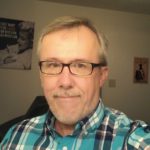We asked several of the 50+ Strong and Healthy Community Scholars to share their USCA experience with us. This week, we have Steven Manning.
 My experience with the 2018 USCA: First impression was the immediate connection I felt with recipients of the 50+ scholarships. The staff was amazing, they made themselves available to us, they guided us through the workshops, and they answered all of our questions. They went above and beyond my expectations.
My experience with the 2018 USCA: First impression was the immediate connection I felt with recipients of the 50+ scholarships. The staff was amazing, they made themselves available to us, they guided us through the workshops, and they answered all of our questions. They went above and beyond my expectations.
As a result of this conference, friendships were made. We were able to share our own stories of living with HIV and exchange ideas and concerns. It was an honor to be a part of the 50 + scholars. We are a group of the HIV population that up until recently got overlooked. We are living longer and our needs are changing. Having workshops focused on this is really important. It was really beneficial not only to have these types of workshops, but to actually have the 50+ group. We were able to have our voices heard and to share our own personal experiences. This made the experience so much better. We have a story to tell and people are listening to us.
The workshops were geared towards the HIV aging population. NMAC recognized this and not only helped educate the HIV populations attending the conference, but, at the same time were able to educate the medical providers, case managers, and healthcare workers. We were given the tools to go back to our individual communities to help educate them about ongoing issues with the HIV aging population. The workshops brought much needed attention to people isolating and the need to reach out to them and the seriousness to this ongoing issue. There are so many important issues that need attention. Recognition was brought to the aging transgender population as well.
NMAC understands the needs of the community; they have made it their goal to do something about them. This was seen throughout the entire conference. This conference has and will allow me to take what I have learned and share it with my peers in the HIV community and outside of the HIV community.
I want to personally thank the staff and board members of NMAC for all of their hard work and dedication that made this conference possible. This USCA provides a safe space to connect, educate, and take this information out into our individual communities. NMAC understands the important issues, and makes it their mission to bring attention to it.
To summarize I felt very fortunate to attend this year’s conference. It was an experience that will last for a very long time.